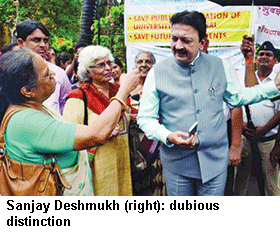 The university of mumbai (mu, estb.1857) continues to be dogged by controversies ever since it replaced the varsity’s age-old manual assessment system with on-screen marking (OSM) — an online examination assessment system — earlier this year.
The university of mumbai (mu, estb.1857) continues to be dogged by controversies ever since it replaced the varsity’s age-old manual assessment system with on-screen marking (OSM) — an online examination assessment system — earlier this year.
Activists seeking information under the Right to Information Act (RTI) say the university tweaked the tender process to favour the Bangalore-based MeritTrac Services Pvt. Ltd, to introduce computerised assessment of 477 exams conducted by the university in March, April and May 2017. Despite demands from activists, students and academicians to blacklist the company and seek monetary compensation from it for causing an unprecedented delay of over 120 days in announcing examination results that has affected the future of 425,000 students, the company has been paid Rs.1.18 crore as part-payment towards two bills raised by it of Rs.4.17 crore for services rendered.
The new online assessment system promised to speed up the evaluation process by automating several time-consuming manual processes such as totaling of marks and preparing final mark-sheets etc. MeritTrac, a 100 percent subsidiary of Manipal Global Education, of which former Infosys board member Mohandas Pai is chairman, had undertaken to scan and upload 1.75 million answer scripts and distribute them to evaluators at the university’s assessment centres.
However, according to MU sources the entire assessment process is in complete disarray with technical glitches arising in the linking of answer sheets to the correct question paper codes and seat numbers of students, incorrect scanning and uploading, students wrongly marked absent for exams they had written and several thousand answer scripts being misplaced. On September 16, 73,430 plus exam results were held back due to assessment disruptions.
According to aggrieved students, MU not only missed several results delivery deadlines but also violated the Maharashtra Universities Act, 1994 which mandates declaration of results within 45 days of completion of any exam. Vice chancellor Sanjay Deshmukh, accused of unilaterally deciding to overhaul the manual evaluation system despite three members of the managing committee raising objections, was sacked in August — the first ever VC to be fired in the university’s history. Meanwhile, the varsity has received a record number of 72,000 revaluation applications this year, 10,000 of which were still awaiting assessment on November 26.
However, Nagendran Sundarrajan, senior vice president, MeritTrac Services, refuses to take the blame for the exam results delay. “Unfortunately, some media reports misinterpreted MeritTrac’s scope of work without understanding the details and nuances. MeritTrac has been awarded only a part of the overall evaluation work — around 25-30 percent. Some of the most critical activities including tabulation of results, incorporating internal assessment marks, assigning overall weightages etc weren’t a part of MeritTrac’s scope of work, which is where most of the delays occurred,” says Sundarrajan.
In this connection it is worth noting that while the decision to launch the OSM system was announced in January, the varsity took five months before awarding the part contract, after which scanning of answer booklets — the first step of the evaluation process — could commence. Now RTI activist, Anil Galgali claims MU purposely extended the tendering process four times to award the contract to MeritTrac Services over Tata Consultancy Services (TCS) and Shree Computers. He also questions the varsity’s decision to award the contract to MeritTrac even though the company didn’t make a formal presentation to MU’s technical committee.
“Cost seemed to be the only consideration for the varsity which opted for MeritTrac which quoted Rs.23.90 per answer script as against to TCS’ Rs.49.90. According to the technical committee’s report, while Tata Consultancy demonstrated its technology to the technical committee, MeritTrac remained absent,” says Galgali.
For an institution notorious for its bureaucratic processes, MU’s management committee was remarkably generous in sealing the deal with MeritTrac. It not only signed up a three-year contract but also extended it by another three years immediately.
However, MeritTrac spokespersons deny that it received any special favours in the bidding process. MeritTrac’s agreement with the university states the company will be paid a fee of Rs.23.50 per answer script. The expected work volume was 4 million answer scripts for the academic year 2017-18, of which evaluation of 2.2 million answer scripts was slated for the first half of 2017.
With no winners emerging from this benighted contract, it’s hardly a wonder that public-private-partnerships, which are touted as the solutions to the country’s education problems, don’t work.
Dipta Joshi (Mumbai)